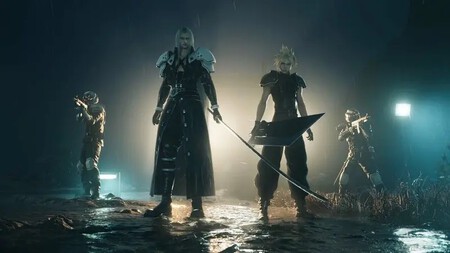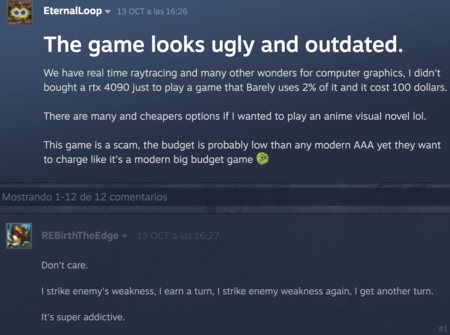I think we are at a point in the generation where we can say that it is not the most prolific in history. It’s not bad, as every year it delivers a handful of works that definitely deserve to be on an updated console or PC. But we can say it’s a bit… scattered. The great works come few and far between, studios are more struggling than ever, layoffs are in the thousands, and fear of failure is palpable practically every month, with titles either not meeting expectations or being delayed to ensure a hit. Do I need to mention that, in the face of this fear, remakes have become a lifeline for many companies? Or that others have migrated to genres and gaming styles that are trendy, or even forcing studios that had no experience (or desire) to change genres?
What worries me about this situation is that there doesn’t seem to be an immediate solution. Many generations take time to pick up steam, we know, until studios get a grip on the new hardware, but clearly this generation has stalled. And it’s curious, because if we were to ask gamers, they would probably say this is one of the generations where they perceive the least technological leap. However, production costs have soared and any production surpasses the $100 million mark.
“You used to have God of War and Assassin’s Creed. But you also had Loco Roco, or Dance Dance Revolution”
Triple digits mean much more than we think. They mean longer development times, to the point where there are many studios where we’re lucky if we see a single game throughout the generation. But they also mean more conservative developments. When the stakes are higher, they have to be safer because money is timid.


It has been GOTY, has sold 20 million, is original and creative and has not cost as much as any AAA. It can be done.
In a way, I feel like we also have to take some responsibility. At what point did we send the message that we wanted endless games, with an immense amount of content and replay value? In a recent interview with Venture Beat, Shawn Layden, former head of Sony Worldwide Studios, compares modern games to European cathedrals. Not just because they are huge projects, full of detail and masterpieces, but because they are no longer built. It’s clear that players want a great game like a cathedral, no pun intended, but, as Layden says, sometimes they only need four walls and a roof to go to church.
Hardware which, on the other hand, is also the most expensive in history, not just in the world of PC
“You used to have God of War and Assassin’s Creed. But you also had Loco Roco, SingStar, and Dance Dance Revolution,” says Layden. “You had this whole spectrum of entertainment opportunities. At 7-12 million per launch, why not take a chance and see what happens? Katamari Damacy, for God’s sake, you couldn’t build it today because you can’t even explain what it is. But now, when every bet is of triple digit millions, risk tolerance is super low. You end up with imitators and sequels and not much else.” All of this leads me to think that, at some point between this generation and the next, maybe we should… slow down a bit.


Could Katamari Damacy exist today?
I know how this sounds. “You can’t stop progress” and all that. But the truth is that technology is advancing to a level of detail where many players are not able to perceive those details like we do. What’s even crazier is that achieving that level of definition, the coveted 4K60 for the same graphics, mind you, is the most titanic effort I’ve ever seen in the industry, having to develop all kinds of scaling techniques because there is no way to get rasterized results even with the most powerful GPUs on the market. Hardware, which, on the other hand, is also the most expensive in history, not just in the world of PC but also with the launch of models like PS5 Pro.
The graphical ceiling is becoming increasingly visible
In terms of graphics, perhaps the next generation should be a mix between the average player and the enthusiast. This has already been a bit with the release of Xbox Series X and S. A powerful version for those who can afford it and leverage it, and a lesser one for those who don’t need as much detail and can rely on techniques like DLSS, FSR, or PSSR. But even with this, we still have the issue of content.


Final Fantasy VII Rebirth has sold millions of copies. The exact number is not known, but it’s not enough.
I rely again on Layden’s words: “We have to reduce ambition. Not creative ambition, not entertainment ambition. I want games of 15-20 hours again. As the average age of players has increased, from 20 to 30 years, we’ve seen that people who used to have a lot of time and little money have gone from having little time and a lot of money. That person can’t fit an 80-hour game into their lifestyle. I still have Red Dead Redemption 2 sealed on my shelf. It’s too much.” I would like to add to Layden’s comment that this particularly affects the AAA market, which belongs more to the “more money/less time” range. Yes, there will be exceptions, but with the unbeatable amount of free games, gifts, and deals (we don’t even have to mention piracy anymore), we live in a time where anyone can enjoy a game without spending much money.
“We have to reduce ambition. Not creative ambition, not entertainment ambition” – Shawn Layden
Even for someone like me, who is in this industry and has eternal love for JRPGs, I also feel it. I don’t have time to continue my beloved The Legend of Heroes series, and I’m having trouble finding time to start Metaphor: ReFantazio. The examples I have given are not random. Japan has found a very interesting model to continue with its 100-hour games. They simply are not the most cutting-edge in the world. They have slowed down. They know they can afford to develop games that long and amortize them thanks to a good fan base and continue developing new ideas or continuing their good stories.


The two sides of gaming
Not everyone will see it this way. This image I took from Steam, I think, perfectly captures the two mentalities of modern gaming: one that wants to push their hardware to the maximum and be amazed by the graphics (and may feel cheated if this is not achieved) and one that doesn’t care if the game is cutting-edge, because they enjoy its other aspects.
Companies whether they like it or not, the final price of the video game will not be able to increase much more
Continuing with the Japanese example, Final Fantasy VII Rebirth has been well-received, and yet, it’s not enough. Square-Enix has felt that it hasn’t sold as much as expected. The only difference between Rebirth and Metaphor or the Trails series is that technical complexity. They have the same fans and are equally appreciated, but to justify the rollout of Rebirth, you need numbers that are hard to achieve for a JRPG.

Layden concludes: “Crash Bandicoot, in 1998, cost $49.99. But its production probably cost less than $7 million. Sells between 10-15 million units? Well. In today’s world, making God of War costs more than $100 million, and yet you can only charge $59.99. What about your break-even point? So by the late ’90s, there were many more Ferraris in the developers’ parking lot. The profit-sharing exploded. Price elasticity has been a big problem in games.”
Companies, whether they like it or not, the final price of the video game will not be able to increase much more. The more they use this route, the more people will be hesitant to dive headfirst into an experience that may or may not please them and, worse still, may not finish due to lack of time. We need a better balance, and that requires reducing costs, cutting content and hours, and accepting that not every month we can have the Holy Family of video games. What you can do, and it’s more affordable, is to supplement all of this with creativity, with more risk to personal and less ambitious works, and perhaps in this way, we don’t have to lay off thousands of workers every year.
In 3DJuegos | It caught me with its premise but what I didn’t expect from this fantasy and ancient civilizations adventure is that it would forget the story so soon. Review of Unknown 9
In 3DJuegos | What I had seen of LEGO Horizon Adventures so far doesn’t do justice to what this action game really promises. I tried it again, and this time in cooperative


